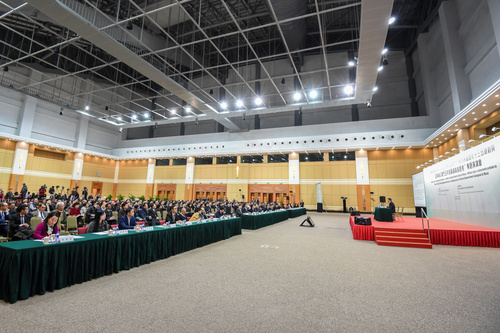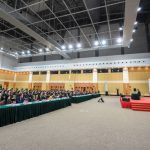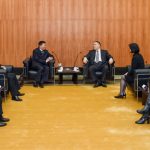 Professor Hu Angang deliveres a presentation at East Asian Games Dome.
Professor Hu Angang deliveres a presentation at East Asian Games Dome.
The Chief Executive, Mr Chui Sai On, said Macao Special Administrative Region’s Five-Year Development Plan outlined the city’s key aspirations and a set of achievable goals. Its implementation would lead Macao to further social and economic achievements. Mr Chui made the comments on Tuesday (15 March) during a meeting in Macao with the Director of Tsinghua University’s Institute for Contemporary China Studies, Professor Hu Angang. The professor was a member of the commission that drafted the nation’s 13th Five-Year Plan, and is a consultant to Macao’s Five-Year Development Plan. The city’s first master development plan covers the period from 2016 to 2020. In the meeting, Mr Chui said such a blueprint for Macao was a welcome innovation for the process of government. He added that one of the challenges was to develop the guidelines for each stage of the Five-Year Development Plan. Prof. Hu’s advice would be particularly important in relation to Macao’s deployment of resources, its setting of targets and the way the city coordinates its development with that of the whole country, said the Chief Executive. Prof. Hu noted that having a clear development plan spanning several years was crucial for a community and for a country. He said that view was based on his research, which compared the 20 countries in the world that had achieved what he termed the best economic performance over the past three decades. Mr Chui said he was glad to have Prof. Hu’s support and advice when formulating Macao’s Five-Year Development Plan. After the meeting with Mr Chui, Prof. Hu delivered a presentation at a seminar held at the Macao East Asian Games Dome. He outlined some of his ideas regarding Macao’s Five-Year Development Plan and shared more details of the country’s 13th Five-Year Plan. Details included information on the national policy goal of building a moderately prosperous society; the 13th Five-Year Plan’s major targets; and the Central Government’s respective strategies for strengthening the development of Macao and Hong Kong. Prof. Hu said Macao’s special status under China’s “One country, two systems” policy and Macao’s role as a free port were important advantages that the city could draw on to assist the whole country’s development. The city could also draw on the support of other national policies in order to create fresh economic opportunities, the scholar said. In that way, Macao’s prosperity could grow in parallel with the nation’s prosperity. Prof. Hu additionally said the policy of developing Macao as a World Centre of Tourism and Leisure (known as the “Centre” policy) would help optimise the city’s position in relation to the country’s development. In reference to the nation’s 13th Five-Year Plan, Prof. Hu mentioned five key themes: innovation; coordination; green development; opening up; and sharing. Those themes related to the existing national and local policy vision of “putting people first”, he added. Prof. Hu said the 13th Five-Year Plan’s seven major targets, its 22 sub-targets and the benchmarking systems for evaluating their delivery were designed with practicality in mind. Overall they provided a scientific approach to the delivery and measurement of national development. During the seminar session, Prof. Hu said he was impressed by the SAR Government’s work and its support for the people regarding education, health services, employment, social security and housing. Macao has a strong foundation and conditions for further socio-economic development, he added. Officials attending Tuesday’s seminar included: the Secretary for Administration and Justice, Ms Chan Hoi Fan; the Secretary for Security, Mr Wong Sio Chak; the Secretary for Social Affairs and Culture, Mr Tam Chon Weng; the Secretary for Transport and Public Works, Mr Raimundo do Rosário; the Commissioner Against Corruption, Mr Cheong Weng Chon; the Commissioner of Audit, Mr Ho Veng On; the Commissioner-General of the Unitary Police Service, Mr Ma Io Kun; the Director-General of the Macao Customs Service, Mr Vong Iao Lek; and the Public Prosecutor-General, Mr Ip Son Sang.
View gallery


